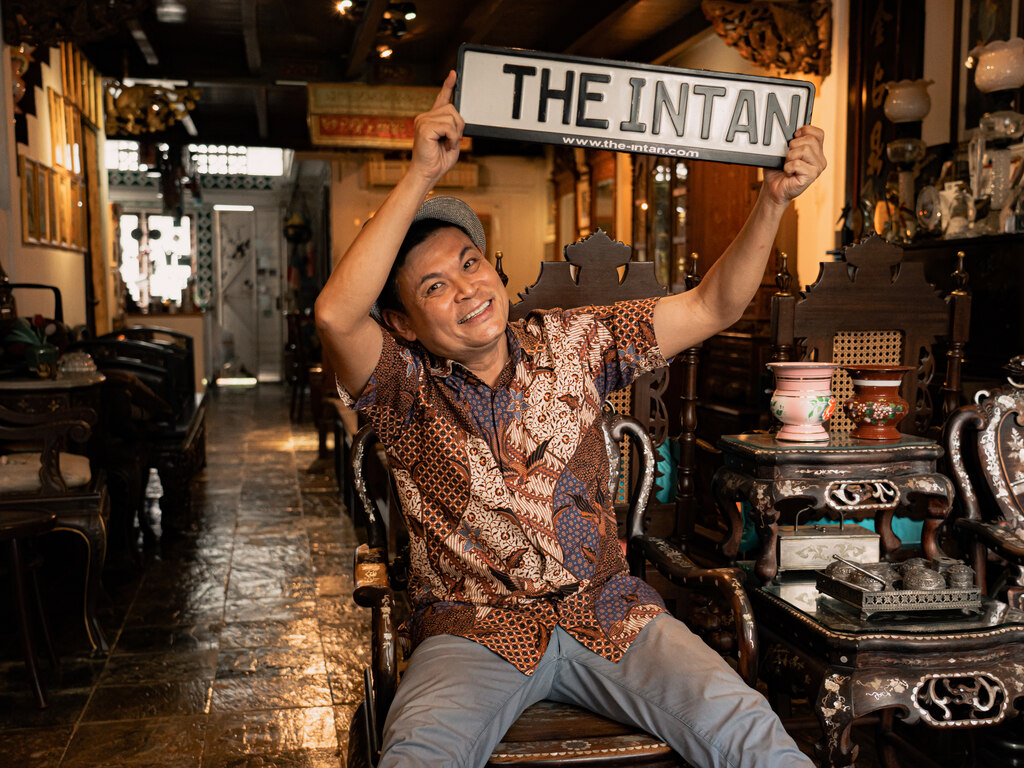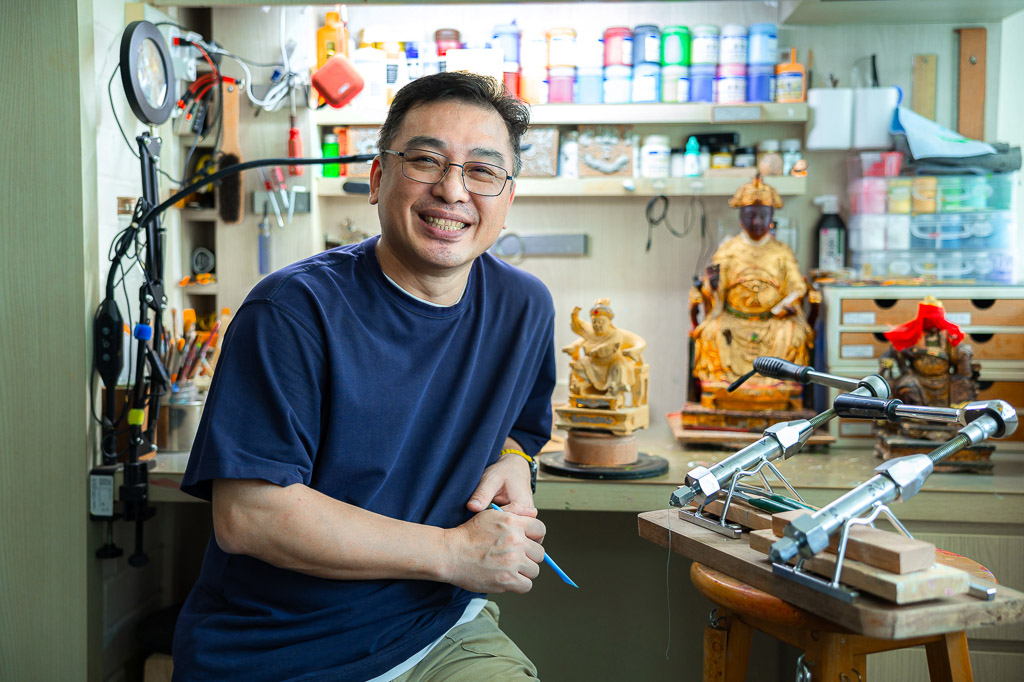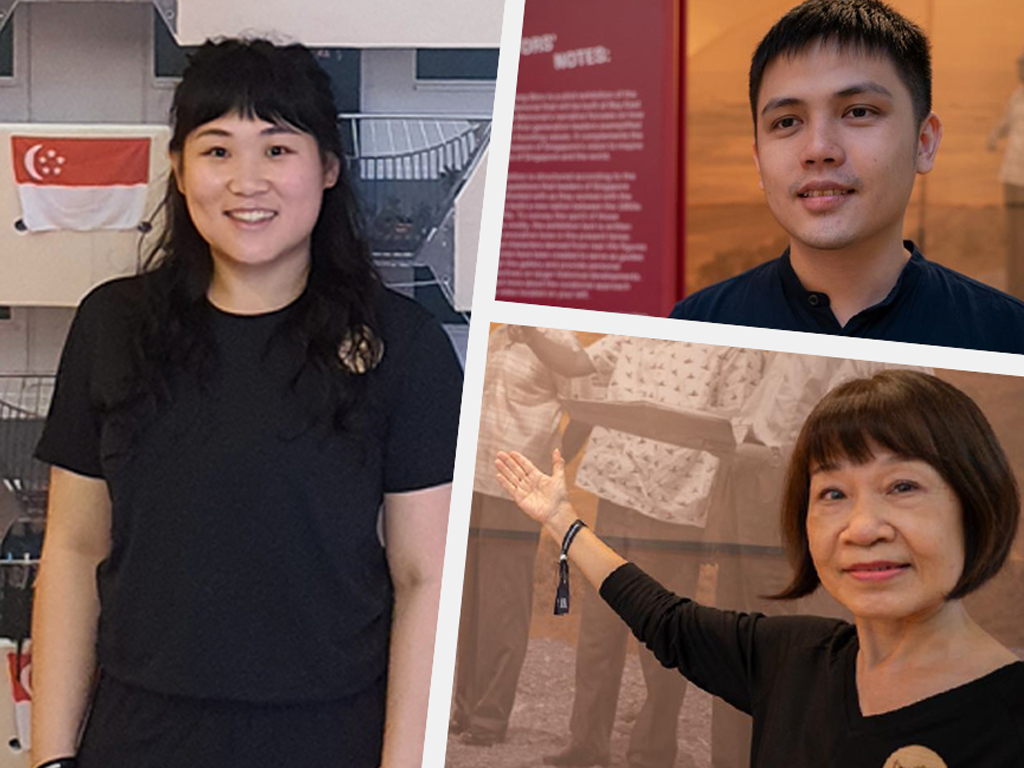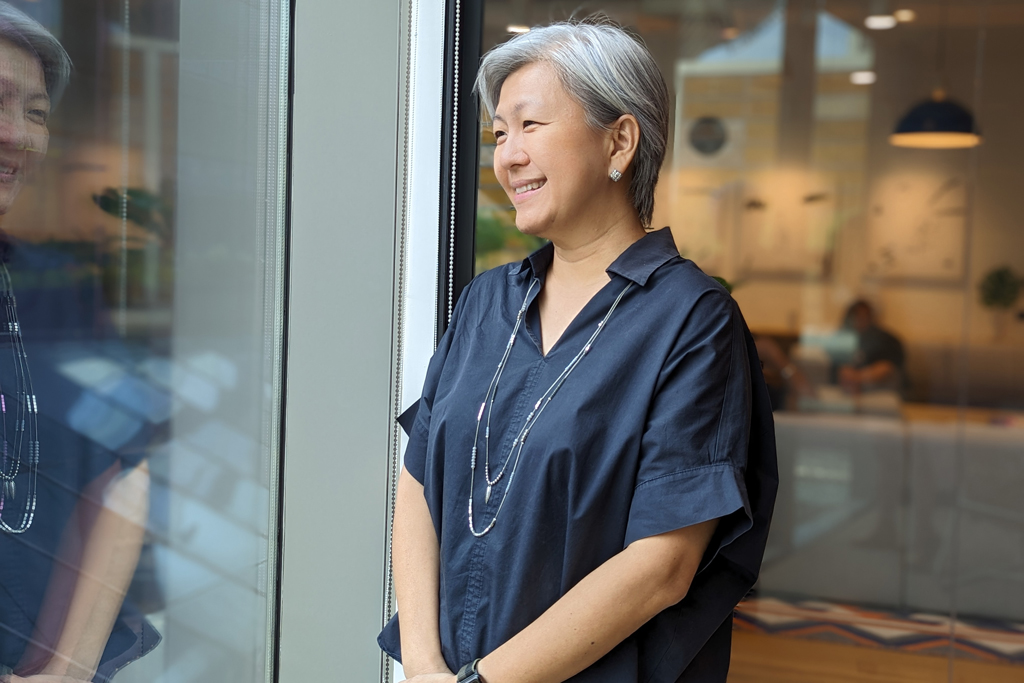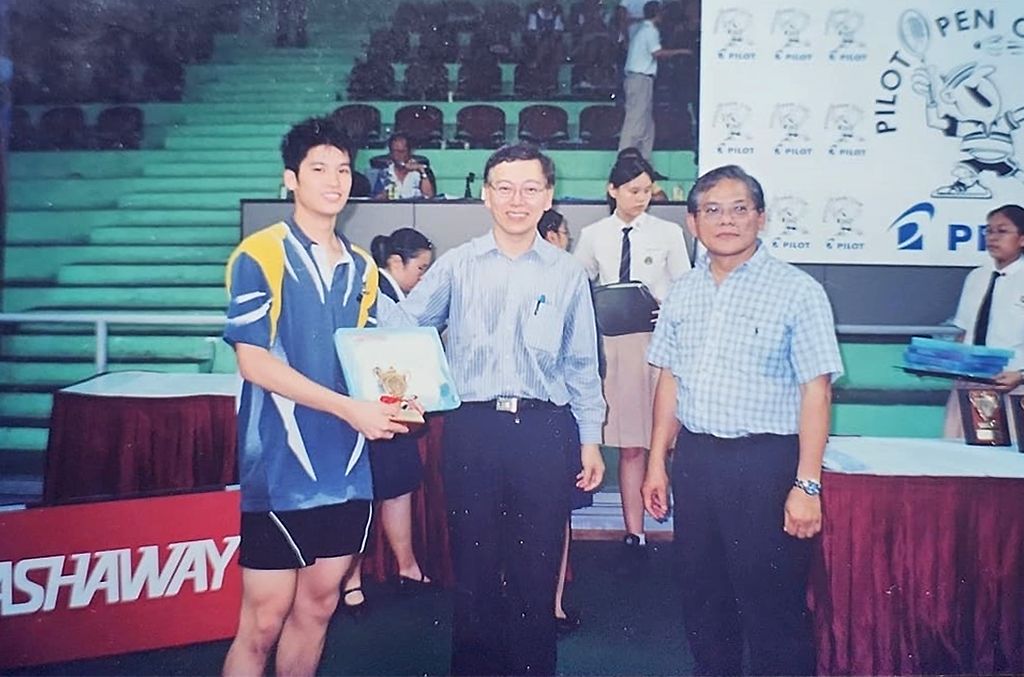Making A Home Away From Home
Three foreigners who have made the Lion City home have amassed huge social media followings with some uniquely Singaporean content. Whether it is exploring local neighbourhoods or documenting daily life here, their experiences bring fresh perspectives on the city-state.
- 10 Aug 2022
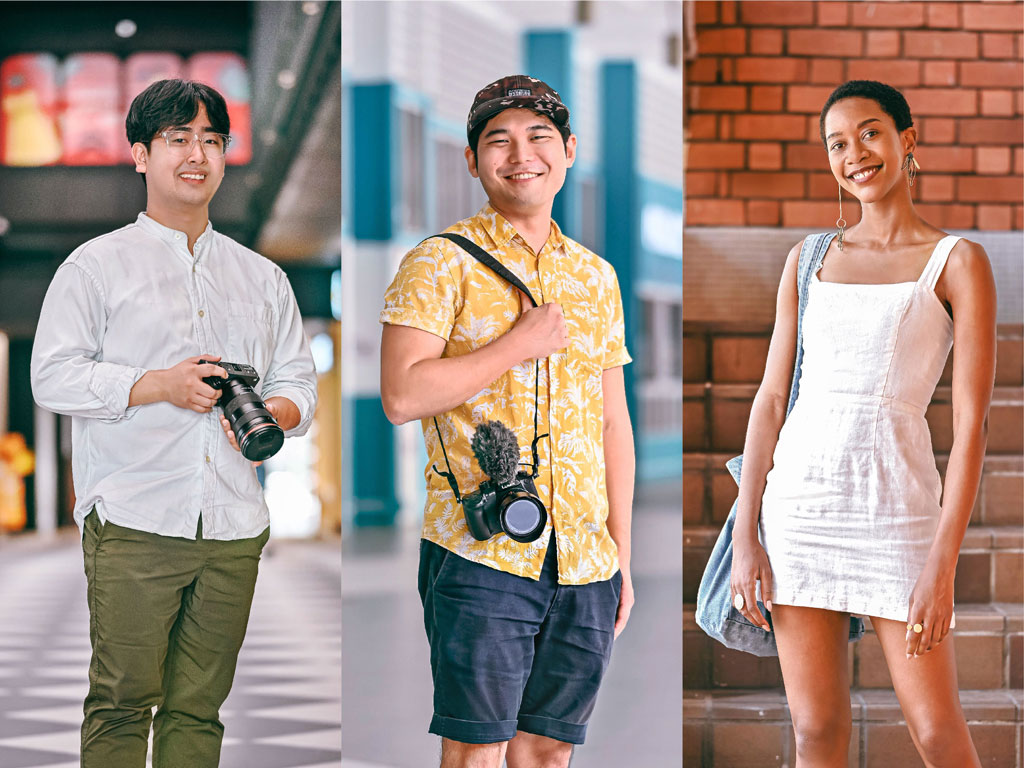
Despite hailing from different parts of the world, Eric, Ghib and Iwani have come to call Singapore home.
From exploring the heartlands to drinking kopi, these foreigners now call Singapore home
Holding a camera in his outstretched arm, Ghib Ojisan is ready to roll. The Japanese YouTuber is in the far west of Singapore exploring the residential estate of Jurong East. Already, he is in on a local joke about the area, describing it as ‘ulu’.The two-hour Jurong adventure takes him to the popular Westgate and JCube shopping malls. He strolls around the idyllic Chinese Garden, before heading to the Yuhua Village Market and Food Centre for a cup of kopi-o kosong. This journey to the west would later go on to garner over 82,000 views on YouTube.
This 31-year-old can easily pass off as a local. He punctuates his conversations with the occasional lahs and lors, chopes tables with tissue paper packets, and lives in a four-room HDB flat with his Singaporean wife.
His YouTube channel has about 240,000 followers, with 80 per cent of the viewers coming from Singapore. It has a simple motto: “Rediscover. Singapore.” True to its aim, the videos are leading many locals to view their country in a new light — and realise that the Little Red Dot is not as dull as they might think.
“Singapore is such a small country but there are still so many things to do and eat. I aim to showcase it through my videos,” says Ghib, who has lived here since 2019. These activities include exploring the rustic Changi Village — away from the typical bustle of Singapore — and getting a haircut from Singapore’s last street barber. “Many of my viewers get inspired by my videos and start to realise Singapore is not boring — they just became too used to it and stopped exploring.”
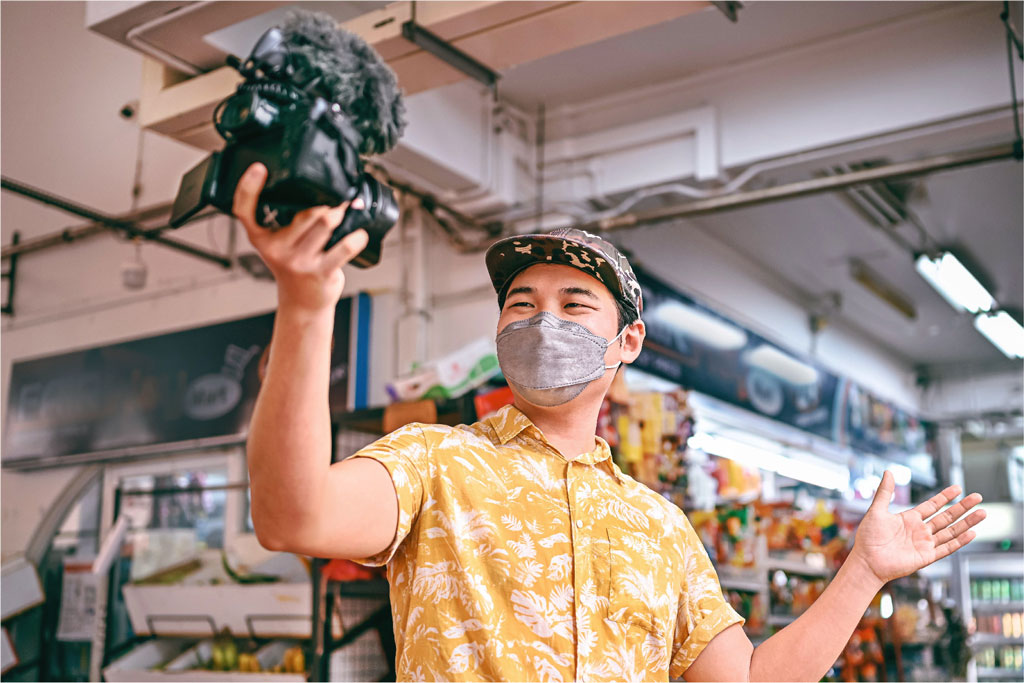
Full-time YouTuber Ghib is helping his viewers to see Singapore in a different light through his videos, where he explores different corners of the island.
Today, about 1.47 million foreign non-residents call Singapore home. Some, like Ghib, have documented their lives here on social media, with their online work helping them adapt to their new surroundings.
On TikTok, another foreign content creator is adding his own spin to one of Singapore’s most beloved topics: food.
South Korean tech creative Eric Youn’s TikTok account — thelifeofesy — serves up a tasty blend of Singaporean and Korean cultures. While some videos feature popular local food haunts like Lau Pa Sat and Fengshan Market, others are tutorials on how to make Korean dishes like ttukbaegi bulgogi — a beef stew — using ingredients sourced from local supermarkets like FairPrice or Giant.
On TikTok, another foreign content creator is adding his own spin to one of Singapore’s most beloved topics: food.
South Korean tech creative Eric Youn’s TikTok account — thelifeofesy — serves up a tasty blend of Singaporean and Korean cultures. While some videos feature popular local food haunts like Lau Pa Sat and Fengshan Market, others are tutorials on how to make Korean dishes like ttukbaegi bulgogi — a beef stew — using ingredients sourced from local supermarkets like FairPrice or Giant.

Eric editing a video that will be posted on this TikTok channel, which serves as a cultural bridge between South Korea and Singapore.
Certain clips serve a deeper purpose, such as the one where he gives Singaporeans a lesson on Korean etiquette. “As I’m living in Singapore, I want to experience life as a local,” explains the 33-year-old, who moved over in 2020 for work. “But at the same time, Korean culture is very sought after in Singapore because of the K-pop wave. So I want to be the bridge between our two cultures.”
In one of his earlier days here, someone stopped him as he was returning his tray at a hawker centre. It turned out that he had misplaced non-halal utensils at a tray-return section reserved for halal food. “I didn’t know what halal meant,” he says. “Those cultural differences were a bit confusing.”
Communication was also a big barrier as Singlish proved difficult to master. “I didn’t really understand what people were saying. It was almost kind of scary for me to talk to locals,” recalls Ghib, noting how fast Singaporeans tend to speak and the sheer amount of colloquialisms that peppered their speech.
Fortunately, local friends helped to ease their transition. For instance, Iwani Mawocha’s life here was made easier by her best friend, Claris Liow, a Singaporean she had met while studying at the Yale-NUS College in 2014. The pair bonded over common interests like skateboarding and photography, and dinners at her home are now a frequent occurrence.
A whole new world
But before Eric became a cultural link between two different worlds, he first had to adapt to his new home. Coming from South Korea, a largely homogenous society, navigating Singapore’s diverse cultures took some getting used to.In one of his earlier days here, someone stopped him as he was returning his tray at a hawker centre. It turned out that he had misplaced non-halal utensils at a tray-return section reserved for halal food. “I didn’t know what halal meant,” he says. “Those cultural differences were a bit confusing.”
Communication was also a big barrier as Singlish proved difficult to master. “I didn’t really understand what people were saying. It was almost kind of scary for me to talk to locals,” recalls Ghib, noting how fast Singaporeans tend to speak and the sheer amount of colloquialisms that peppered their speech.
Fortunately, local friends helped to ease their transition. For instance, Iwani Mawocha’s life here was made easier by her best friend, Claris Liow, a Singaporean she had met while studying at the Yale-NUS College in 2014. The pair bonded over common interests like skateboarding and photography, and dinners at her home are now a frequent occurrence.
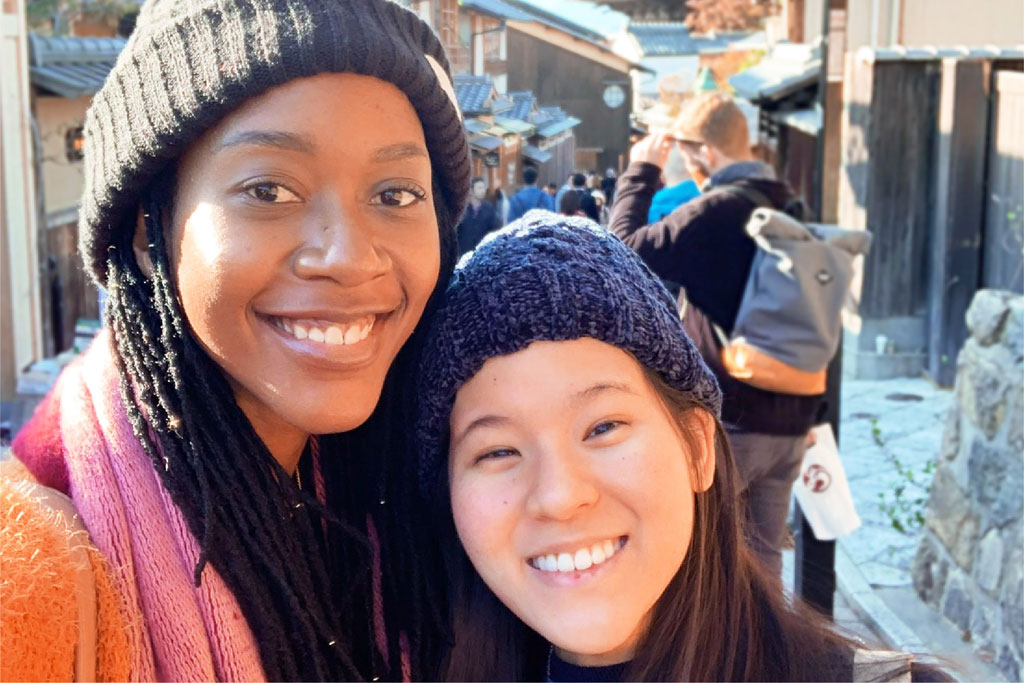
Iwani and her bestfriend, Claris, who has been instrumental in helping the Zimbawean settle down here. (Photo courtesy of Iwani Mawocha)
“It’s nice knowing there’s someone here you can count on,” says the 26-year-old Zimbabwean UI/UX designer, who has been living here for seven years. “My family are reassured that I’m going to be okay now that they’ve seen me find a foothold here.” A portion of her TikTok account, which has more than 170,000 followers, sees her sharing her daily life in Singapore.
Creating local content has also helped them better understand Singapore’s diverse cultures. For instance, during the month of Ramadan this year, Ghib went on a day-long fast. With the guidance of a local Muslim friend, he documented the process, receiving praise from local viewers for sharing the religion’s customs.
The cultural immersion has in turn transformed their outlook. Before moving here, Eric had expected Singapore to be monotonous and strict based on what he had read of the country. But he was soon proven wrong.
Describing Singapore as having the “best of all worlds”, he says, “I realised there are so many layers of Singapore. There are so many subcultures, various ethnicities and (so much) diversity. It’s unique for me to see how a country can achieve unity within diversity — it’s fascinating.”
Creating local content has also helped them better understand Singapore’s diverse cultures. For instance, during the month of Ramadan this year, Ghib went on a day-long fast. With the guidance of a local Muslim friend, he documented the process, receiving praise from local viewers for sharing the religion’s customs.
The cultural immersion has in turn transformed their outlook. Before moving here, Eric had expected Singapore to be monotonous and strict based on what he had read of the country. But he was soon proven wrong.
Describing Singapore as having the “best of all worlds”, he says, “I realised there are so many layers of Singapore. There are so many subcultures, various ethnicities and (so much) diversity. It’s unique for me to see how a country can achieve unity within diversity — it’s fascinating.”
The Singapore Effect
Besides fresh insights, these foreign residents have also picked up some uniquely local habits. All three are now well-attuned to Singlish, with Eric and Ghib even speaking it on a regular basis. They are also smitten with local grub — Iwani now considers a plate of char siew rice comfort food.
Iwani digging into one of her favourite local dishes- char siew rice. In fact, she even considers it as comfort food now.
Their reflections on these newly acquired preferences or proficiencies highlight certain attributes of Singapore that often go unnoticed. For instance, Eric appreciates how Singlish encapsulates the country’s efficiency. “Singlish is very simple, truncating large sentences into a few words that people understand perfectly,” he notes.
Meanwhile, Iwani respects the country’s foresight. “One of the things I admire here the most is how far ahead things are planned,” she says, citing the example of the Thomson-East Coast MRT line that is slated to open near her home in Telok Kurau within the next few years. The project has been almost a decade in the making. “You can tell so much thought goes into what comes next,” she adds.
Singapore’s relatively casual atmosphere has also been a refreshing change for Eric and Ghib, who come from countries with more formal cultures. “I feel more free,” says Eric. “In South Korea, it’s rather hierarchical — there’s a limit to how much you can express yourself. The environment here helps me to express myself…people are not afraid to make an honest comment.”
He recalls a time when he had a change of hairstyle and asked a Singaporean friend for his opinion. “My friend just replied, ‘I think you should go back to the salon’,” he says with a laugh. “In Korea, we won’t be so straightforward.”
“I feel like I can be myself,” echoes Ghib. “In Japan, it’s more difficult to express yourself because there’s this pressure that we all have to be the same.” Iwani, who is also a model, believes the city-state has plenty of untapped potential as a cultural capital. “I love championing local brands and products. I really think Singapore could be one of those places that is a globally known brand, like Korea and Japan,” she says. “We don’t know the gem we’re sitting on.”
Finding groups who share your interests is one easy way, they advise. “Be part of a community that allows you to have regular exposure to people, which helps you build that friendship,” says Iwani. Eric, for instance, joined a swing dancing studio and attended judo classes here. “Interest and hobbies have helped me connect with people,” he says. Collaborations with social media personalities here have also expanded his local network of friends.
Meanwhile, Iwani respects the country’s foresight. “One of the things I admire here the most is how far ahead things are planned,” she says, citing the example of the Thomson-East Coast MRT line that is slated to open near her home in Telok Kurau within the next few years. The project has been almost a decade in the making. “You can tell so much thought goes into what comes next,” she adds.
Singapore’s relatively casual atmosphere has also been a refreshing change for Eric and Ghib, who come from countries with more formal cultures. “I feel more free,” says Eric. “In South Korea, it’s rather hierarchical — there’s a limit to how much you can express yourself. The environment here helps me to express myself…people are not afraid to make an honest comment.”
He recalls a time when he had a change of hairstyle and asked a Singaporean friend for his opinion. “My friend just replied, ‘I think you should go back to the salon’,” he says with a laugh. “In Korea, we won’t be so straightforward.”
“I feel like I can be myself,” echoes Ghib. “In Japan, it’s more difficult to express yourself because there’s this pressure that we all have to be the same.” Iwani, who is also a model, believes the city-state has plenty of untapped potential as a cultural capital. “I love championing local brands and products. I really think Singapore could be one of those places that is a globally known brand, like Korea and Japan,” she says. “We don’t know the gem we’re sitting on.”
Integration 101
Having adapted well to the life here, the trio are well-positioned to share tips with fellow foreigners who are looking to settle in quickly.Finding groups who share your interests is one easy way, they advise. “Be part of a community that allows you to have regular exposure to people, which helps you build that friendship,” says Iwani. Eric, for instance, joined a swing dancing studio and attended judo classes here. “Interest and hobbies have helped me connect with people,” he says. Collaborations with social media personalities here have also expanded his local network of friends.
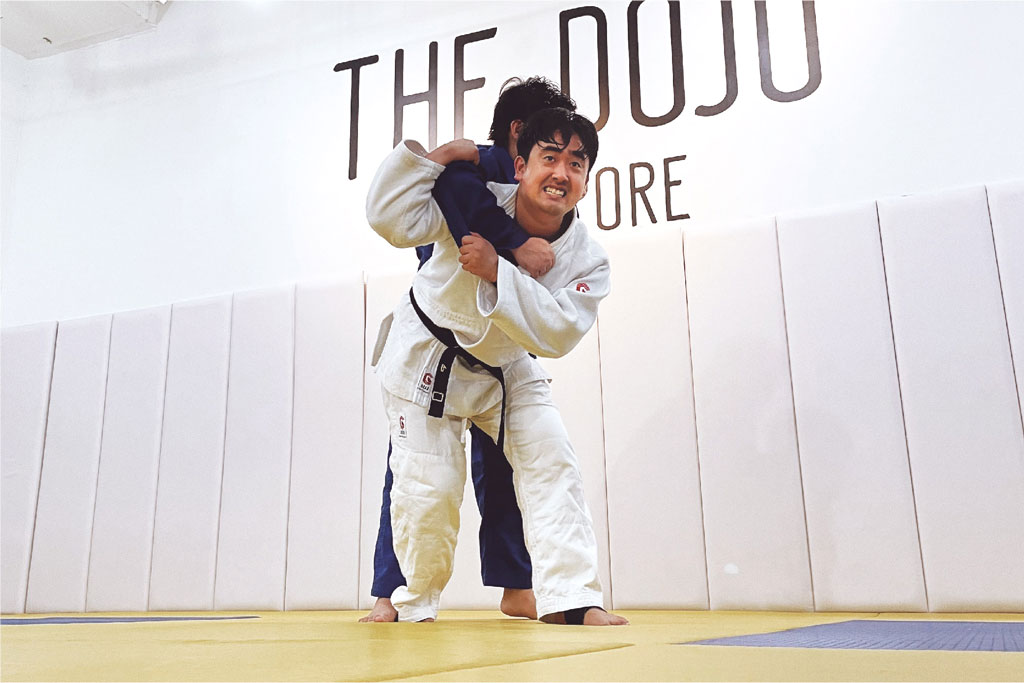
Eric training at his regular Judo club in September 2021. For foreigners looking to quickly settle down in Singapore, he recommends that they can join communities sharing similar interests and hobbies. (Photo courtesy of Eric Youn)
Newcomers should also have a keen interest in and open-mindedness about the culture and people here, notes Ghib. Picking up local practices can be one approach. “I feel like the locals like it when foreigners speak Singlish,” he says. “Try to blend into the culture and society.”
On their part, Singaporeans can make foreign guests feel welcome by reaching out to them first, says Iwani. “I know it can be intimidating, but it’s even more so to us because this is your home, this is your community, and a lot of us aren’t the type to boldly invite ourselves in,” she notes.
Food can be another surefire way to forge bonds. “You can invite them out for a local dinner — there definitely will be things to talk about,” says Eric, who has been taken to hawker centres by Singaporean friends. Despite coming from different countries, one thing’s for sure: all three see Singapore as home now. “If Singapore is mentioned in a movie that I’m watching, I’m excited,” says Iwani. “So many of my formative years have been spent here. It’s my home now.”
Ghib knows exactly what she means, having even felt a sense of relief after returning from a visit to his family in Japan recently. “It’s like I came back to my home,” he says.
*This feature was completed while Iwani was living in Singapore. She is currently overseas, furthering her studies and modelling career.
On their part, Singaporeans can make foreign guests feel welcome by reaching out to them first, says Iwani. “I know it can be intimidating, but it’s even more so to us because this is your home, this is your community, and a lot of us aren’t the type to boldly invite ourselves in,” she notes.
Food can be another surefire way to forge bonds. “You can invite them out for a local dinner — there definitely will be things to talk about,” says Eric, who has been taken to hawker centres by Singaporean friends. Despite coming from different countries, one thing’s for sure: all three see Singapore as home now. “If Singapore is mentioned in a movie that I’m watching, I’m excited,” says Iwani. “So many of my formative years have been spent here. It’s my home now.”
Ghib knows exactly what she means, having even felt a sense of relief after returning from a visit to his family in Japan recently. “It’s like I came back to my home,” he says.
*This feature was completed while Iwani was living in Singapore. She is currently overseas, furthering her studies and modelling career.

